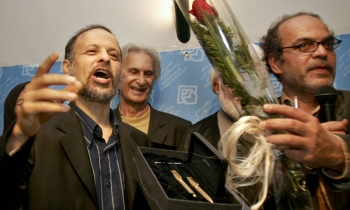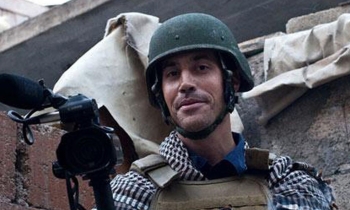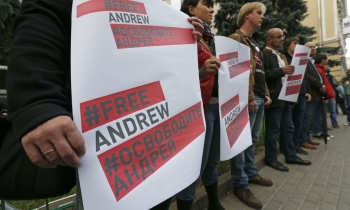Associated Press photographer Bilal Hussein began his third year in US military detention Saturday with the bulk of accusations against him dropped by Iraqi judges and press freedom groups renewing calls for his release. But the Pentagon said Hussein will be held until it reviews the Iraqi amnesty ruling and also said it reserves the option to ignore the decision and keep Hussein in custody.
A four-judge Iraqi judicial panel on Monday halted terrorism-related proceedings against Hussein, saying his case falls under Iraq's 2-month-old amnesty law. The law — which was supported by Washington — allows the amnesty panel to effectively close a case without making findings of guilt or innocence.
More from the Associated Press (AP) creed:
Press freedom groups have hailed the decision and appealed for the immediate release of Hussein, 36, who has been in custody since his arrest by U.S. Marines on April 12, 2006, in Ramadi, about 70 miles west of Baghdad.
The amnesty ruling, however, may not include a separate allegation that Hussein had contacts with the kidnappers of an Italian citizen, Salvatore Santoro. In December 2004, Hussein photographed Santoro's body with two masked insurgents standing over it with guns.
Hussein was one of three journalists who were stopped at gunpoint by insurgents and taken to see the propped-up body. None of the journalists witnessed his death, said Santiago Lyon, AP's director of photography.
On Thursday, a spokesman for the U.S. detention command in Iraq, Lt. Cmdr. Kenneth Marshall, said Hussein will be held until military authorities can review the amnesty order.
Separately, U.S. authorities have said a U.N. Security Council mandate allows them to retain custody of a detainee they believe is a security risk even if an Iraqi judicial body has ordered that prisoner freed. The U.N. mandate is due to expire this year.
Throughout his incarceration, Hussein has maintained he is innocent and was only doing the work of a professional news photographer in a war zone. Hussein was a member of the AP team that won a Pulitzer Prize for photography in 2005.
"We believe Bilal's detention was part of a sweep of photographers by the military and was intended to prevent coverage of a part of the war that was not going well," AP President Tom Curley said last month.
After the Iraqi ruling, prominent press groups and rights advocates renewed appeals for Hussein's release.
Reporters Without Borders urged U.S. authorities to "release him without delay and to not persist in bringing new charges in order to prolong his detention." Human Rights Watch said: "It's time to set him free."
In December, the U.S. military brought Hussein's case into the Iraqi justice system. The military presented its files to an investigating judge, who imposed a gag order and submitted his findings to the Central Criminal Court of Iraq to determine whether the case should go to trial.
In February, however, parliament approved a law providing amnesty to those held for insurgency-related offenses — including detainees such as Hussein who have never been convicted.
Hussein was a shopkeeper when he was hired by the AP to help with logistical support about a year after the 2003 U.S.-led invasion of Iraq. He was trained in photography and began work as a photographer in September 2004 in his hometown of Fallujah, about 40 miles west of Baghdad.









